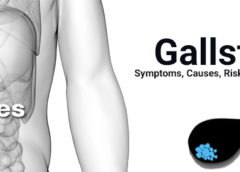Gallstones are “stones” which made in the gallbladder or also known as bile ducts. Cholesterol, black pigment, and brown pigment are common types of gallstones. The gallbladder is responsible for storing bile, which is a greenish-brown fluid used to digest fats in the digestive process. Bile is produced in the liver. The proportion of the gallstone population in New Zealand may be as high as 20 per cent.
It’s important to note that people who are suffering from gallstones rarely get disturbed by them and may not even note the stones are there. In these cases, no treatment is needed.
Symptoms
In most of the people, there are no symptoms at all because the stones stay in the gallbladder and cause no problems.
However, gallstones can occasionally lead to cholecystitis or an inflamed gallbladder.
The primary symptom is pain that all of a sudden comes on and gets worse fastly. This pain can happen on the body’s right side, below the ribs, between the blades of the shoulder or in the right shoulder.
You may also experience:
- Back Pain Between The Shoulder Blades.
- Pain In Your Body’s Right Side, Below The Ribs
- Pain In The Right Shoulder
- Sweating
- Restlessness
- Nausea
- Vomiting
- Dark Urine
- Clay-Coloured Stools
- Stomach Pain
- Burping
- Diarrhoea
- Indigestion
When to seek medical attention
If you have any signs or symptoms that are worrying you, make an appointment with your doctor.
If you experience these symptoms during or after a gallbladder attack see a doctor immediately:
- Pain in abdominal so severe that you cannot find a comfortable place or sit
- Jaundice in which skin becomes yellowish and whites of eyes
- High fever with chills
What causes gallstones?
The exact causes of the gallstones are not clear at all. Doctors think gallstones may result when:
Excess cholesterol in the bile
Excess cholesterol in the bile may result in yellow cholesterol stones. If your liver makes much cholesterol than your bile can dissolve the hard stones may develop.
Excess bilirubin in your bile. Conditions like cirrhosis, infections, and blood disorders can cause your liver to make too much bilirubin.
Your gallbladder doesn’t empty correctly. If your gallbladder doesn’t empty completely or frequently enough, bile can become very concentrated, which is leading to gallstone formation.
Gallstone Risk Factors
Risk factors can include:
- Have a family history of them
- Being female
- Are over age 40
- Are of Native American or Mexican descent
- Have diabetes
- Obesity
- Have a diet high in fat and cholesterol but low in fibre
- Don’t get much exercise
- Use pills for birth control or hormone replacement therapy
- Are pregnant
- Have an intestinal disease like Crohn’s
- Have hemolytic anaemia or cirrhosis of the liver
- Take medicine to lower your cholesterol
- Lose too much weight in a short time
- Are fasting
- Smoking
- Too much drinking
What are the complications of gallstones?
There is a lot of complications of a gallstone attack, including:
- Bloating
- Nausea and vomiting
- Abdominal pain
- Shoulder pain
- Back pain
- Chest pain
Prevention
The risk of gallstones can reduce by following:
- Don’t skip meals: If you miss your meals or fasting will increase your risk of developing gallstones. Seek to stick to your normal daily mealtimes.
- Consume Rich-Fibre Foods: Include more rich-fibre foods, like fruits, vegetables and whole grains, in your diet.
- Drink water: Drink a sufficient amount of water. Drink minimum 7-8 glasses in a day.
- Maintain a healthy weight: Having too much weight also maximizes the risk of developing gallstones. Maintain a healthy weight by decreasing the calories and increasing the time of the physical activity. When you reach on the healthy weight, then work to control and maintain that weight by doing the daily exercise and healthy diet
- Vegetarian dies: Infect if you follow the vegetarian diet your risk of developing gallstones may decrease. people who eat non-vegetarians have a higher chance of developing gallstones as compared to vegetarians
- Manage the weight: Manage the weight of your body will also help to prevent the formation of gallstones. However, strong dieting and fastly loss of wait may also make a high risk of developing gallstones.

Leave a Reply
You must be logged in to post a comment.